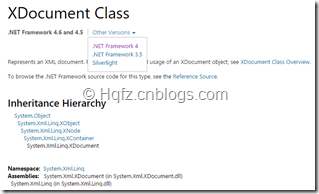引言
虽然现在Json在我们的数据交换中越来越成熟,但XML格式的数据还有很重要的地位。
C#中对XML的处理也不断优化,那么我们如何选择XML的这几款处理类 XmlReader,XDocument 和XmlDocument了?
本文就从对照的方式来总结C#中XML的用法。
简介
System.Xml 命名空间(XmlDocument)为处理 XML 提供基于标准的支持。
LINQ to XML(XDocument )可以进行以下操作:
-
从文件或流加载 XML。
-
将 XML 序列化为文件或流。
-
使用功能构造从头创建 XML 树。
-
使用 LINQ 查询来查询 XML 树。
-
操作内存中的 XML 树。
-
使用 XSD 验证 XML 树。
-
组合使用这些功能将 XML 树从一种形状转换为另一种形状。
XmlReader,XDocument 和XmlDocument
XDocument 和XmlDocument会把所有的XML所有的节点加载到内存中,而XmlReader则不会把所有节点一起加载到内存,而在一定的内存下处理较大的XML。
如果XML文件结构固定,处理比较简单,建议使用XmlReader可以提高程序的性能。
如果XML文件不大或者要做复杂的处理建议使用XDocument。Linq 让程序员省去了很多繁琐冗余的代码,并且兼容设备也比较多,不像XmlDocument在一些设备和系统中不支持。
XDocument VS. XmlDocument
| 比较项 | XmlDocument(经典DOM API) | XDocument (LINQ to XML API) |
| 需要熟悉DOM知识 | ||
| 支持的.NetFramework版本 | .NET version 1.0 + | .NET version 3.5 or later(Linq引入后) |
| 杂项 | Unity3D projects for Windows 8. Xbox 360 and Windows Phone OS 7.0,必须使用XDocument |
|
| Namespace | System.Xml | System.Xml.Linq |
| LINQ to XML | 不支持 | 支持 |
| 行号信息 | 不能提供行号信息 | 通过IXmlLineInfo提供了行号信息 |
| 命名空间 | 支持写 | 支持元素级写 |
| XPath | 不支持 | 支持, 参考System.Xml.XPath |
| 注释 | 不支持 | 支持可扩展的批注集,请参见 LINQ to XML 批注。 |
| 校验Schema | 支持,参考Validate(ValidationEventHandler) | 支持 ,参考Validate(XmlSchemaSet, ValidationEventHandler) |
| 加载XML | 成员方法加载(需要先new XmlDocument()) |
静态方法XElement.Load(@"books.xml") |
创建XML文档
使用XmlDocument 的示例
XmlDocument doc = new XmlDocument(); XmlElement name = doc.CreateElement("Name"); name.InnerText = "Patrick Hines"; XmlElement phone1 = doc.CreateElement("Phone"); phone1.SetAttribute("Type", "Home"); phone1.InnerText = "206-555-0144"; XmlElement phone2 = doc.CreateElement("Phone"); phone2.SetAttribute("Type", "Work"); phone2.InnerText = "425-555-0145"; XmlElement street1 = doc.CreateElement("Street1"); street1.InnerText = "123 Main St"; XmlElement city = doc.CreateElement("City"); city.InnerText = "Mercer Island"; XmlElement state = doc.CreateElement("State"); state.InnerText = "WA"; XmlElement postal = doc.CreateElement("Postal"); postal.InnerText = "68042"; XmlElement address = doc.CreateElement("Address"); address.AppendChild(street1); address.AppendChild(city); address.AppendChild(state); address.AppendChild(postal); XmlElement contact = doc.CreateElement("Contact"); contact.AppendChild(name); contact.AppendChild(phone1); contact.AppendChild(phone2); contact.AppendChild(address); XmlElement contacts = doc.CreateElement("Contacts"); contacts.AppendChild(contact); doc.AppendChild(contacts);
使用XDocument 的示例
XElement contacts =
new XElement("Contacts",
new XElement("Contact",
new XElement("Name", "Patrick Hines"),
new XElement("Phone", "206-555-0144",
new XAttribute("Type", "Home")),
new XElement("phone", "425-555-0145",
new XAttribute("Type", "Work")),
new XElement("Address",
new XElement("Street1", "123 Main St"),
new XElement("City", "Mercer Island"),
new XElement("State", "WA"),
new XElement("Postal", "68042")
)
)
);
加载XML文件
使用XmlDocument 的示例
XmlDocument booksFromFile = new XmlDocument(); booksFromFile.Load(@"books.xml");
使用XDocument 的示例
XElement booksFromFile = XElement.Load(@"books.xml");
命名空间的处理
使用XmlDocument 的示例
public void addXmlns() { string xml = @"<?xml version=""1.0""?> <kml> <Document> <Placemark> </Placemark> </Document> </kml>"; var xmldoc = new XmlDocument(); xmldoc.LoadXml(xml); xmldoc.DocumentElement.SetAttribute("xmlns", "http://www.opengis.net/kml/2.2"); xmldoc.DocumentElement.SetAttribute("xmlns:gx", "http://www.google.com/kml/ext/2.2"); xmldoc.DocumentElement.SetAttribute("xmlns:kml", "http://www.opengis.net/kml/2.2"); xmldoc.DocumentElement.SetAttribute("xmlns:atom", "http://www.w3.org/2005/Atom"); xmldoc.DocumentElement.SetAttribute("xmlns:xsi", "http://www.w3.org/2001/XMLSchema-instance"); string message; message = xmldoc.InnerXml; Console.WriteLine(message); // shows the updated xml }
使用XDocument 的示例
示例1,增加namespace
XmlReader reader = XmlReader.Create(new StringReader(markup)); XElement root = XElement.Load(reader); XmlNameTable nameTable = reader.NameTable; XmlNamespaceManager namespaceManager = new XmlNamespaceManager(nameTable); namespaceManager.AddNamespace("aw", "http://www.adventure-works.com"); XElement child1 = root.XPathSelectElement("./aw:Child1", namespaceManager); Console.WriteLine(child1);
XDocument
XDocument VS. XElement
| XDocument | XElement |
| XDocument.Load() 加载整个XML文档 包括根节点 | XElement.Load()不会加载XML的根节点 |
XElement.Load()示例代码
File.WriteAllText("Test.xml", @"<Root> <Child1>1</Child1> <Child2>2</Child2> <Child3>3</Child3> </Root>"); Console.WriteLine("Querying tree loaded with XElement.Load"); Console.WriteLine("----"); XElement doc = XElement.Load("Test.xml"); IEnumerable<XElement> childList = from el in doc.Elements() select el; foreach (XElement e in childList) Console.WriteLine(e);
XDocument.Load() 示例代码:
File.WriteAllText("Test.xml", @"<Root> <Child1>1</Child1> <Child2>2</Child2> <Child3>3</Child3> </Root>"); Console.WriteLine("Querying tree loaded with XDocument.Load"); Console.WriteLine("----"); XDocument doc = XDocument.Load("Test.xml"); IEnumerable<XElement> childList = from el in doc.Elements() select el; foreach (XElement e in childList) Console.WriteLine(e);
XPath
XPath的强大之处在于处理元素导航还可以进行计算
- XPathSelectElement - Single Element
- XPathSelectElements - Node Set
- XPathEvaluate - Scalars and others
示例:
XML文档
<xml>
<foo>
<baz id="1">10</baz>
<bar id="2" special="1">baa baa</bar>
<baz id="3">20</baz>
<bar id="4" />
<bar id="5" />
</foo>
<foo id="123">Text 1<moo />Text 2
</foo>
</xml>
C#处理计算
var node = xele.XPathSelectElement("/xml/foo[@id='123']"); var nodes = xele.XPathSelectElements( "//moo/ancestor::xml/descendant::baz[@id='1']/following-sibling::bar[not(@special='1')]"); var sum = xele.XPathEvaluate("sum(//foo[not(moo)]/baz)");
这里只是总结知识点,但具体的关于更多XPath的内容可以移步到XPath 教程
XML 批注(注释)
public class MyAnnotation { private string tag; public string Tag { get { return tag; } set { tag = value; } } public MyAnnotation(string tag) { this.tag = tag; } } class Program { static void Main(string[] args) { XElement root = new XElement("Root", "content"); root.AddAnnotation(new MyAnnotation("T1")); root.AddAnnotation(new MyAnnotation("T2")); root.AddAnnotation("abc"); root.AddAnnotation("def"); IEnumerable<object> annotationList; annotationList = root.Annotations(typeof(MyAnnotation)); foreach (object ma in annotationList) Console.WriteLine(((MyAnnotation)ma).Tag); Console.WriteLine("----"); IEnumerable<object> stringAnnotationList; stringAnnotationList = root.Annotations(typeof(string)); foreach (object str in stringAnnotationList) Console.WriteLine((string)str); } }

